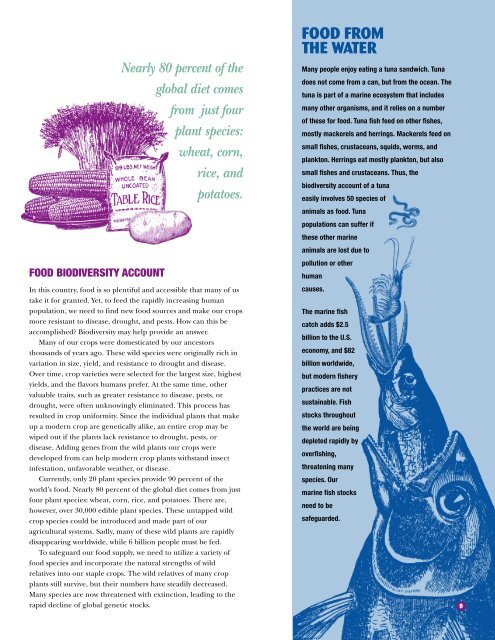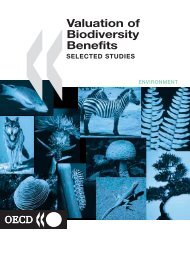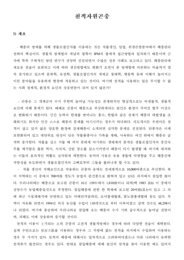Biodiversity: Our Living World-Your Life Depends on It!
Biodiversity: Our Living World-Your Life Depends on It!
Biodiversity: Our Living World-Your Life Depends on It!
You also want an ePaper? Increase the reach of your titles
YUMPU automatically turns print PDFs into web optimized ePapers that Google loves.
Nearly 80 percent of the<br />
global diet comes<br />
from just four<br />
plant species:<br />
wheat, corn,<br />
rice, and<br />
potatoes.<br />
FOOD FROM<br />
THE WATER<br />
Many people enjoy eating a tuna sandwich. Tuna<br />
does not come from a can, but from the ocean. The<br />
tuna is part of a marine ecosystem that includes<br />
many other organisms, and it relies <strong>on</strong> a number<br />
of these for food. Tuna fish feed <strong>on</strong> other fishes,<br />
mostly mackerels and herrings. Mackerels feed <strong>on</strong><br />
small fishes, crustaceans, squids, worms, and<br />
plankt<strong>on</strong>. Herrings eat mostly plankt<strong>on</strong>, but also<br />
small fishes and crustaceans. Thus, the<br />
biodiversity account of a tuna<br />
easily involves 50 species of<br />
animals as food. Tuna<br />
FOOD BIODIVERSITY ACCOUNT<br />
In this country, food is so plentiful and accessible that many of us<br />
take it for granted. Yet, to feed the rapidly increasing human<br />
populati<strong>on</strong>, we need to find new food sources and make our crops<br />
more resistant to disease, drought, and pests. How can this be<br />
accomplished? <str<strong>on</strong>g>Biodiversity</str<strong>on</strong>g> may help provide an answer.<br />
Many of our crops were domesticated by our ancestors<br />
thousands of years ago. These wild species were originally rich in<br />
variati<strong>on</strong> in size, yield, and resistance to drought and disease.<br />
Over time, crop varieties were selected for the largest size, highest<br />
yields, and the flavors humans prefer. At the same time, other<br />
valuable traits, such as greater resistance to disease, pests, or<br />
drought, were often unknowingly eliminated. This process has<br />
resulted in crop uniformity. Since the individual plants that make<br />
up a modern crop are genetically alike, an entire crop may be<br />
wiped out if the plants lack resistance to drought, pests, or<br />
disease. Adding genes from the wild plants our crops were<br />
developed from can help modern crop plants withstand insect<br />
infestati<strong>on</strong>, unfavorable weather, or disease.<br />
Currently, <strong>on</strong>ly 20 plant species provide 90 percent of the<br />
world’s food. Nearly 80 percent of the global diet comes from just<br />
four plant species: wheat, corn, rice, and potatoes. There are,<br />
however, over 30,000 edible plant species. These untapped wild<br />
crop species could be introduced and made part of our<br />
agricultural systems. Sadly, many of these wild plants are rapidly<br />
disappearing worldwide, while 6 billi<strong>on</strong> people must be fed.<br />
To safeguard our food supply, we need to utilize a variety of<br />
food species and incorporate the natural strengths of wild<br />
relatives into our staple crops. The wild relatives of many crop<br />
plants still survive, but their numbers have steadily decreased.<br />
Many species are now threatened with extincti<strong>on</strong>, leading to the<br />
rapid decline of global genetic stocks.<br />
populati<strong>on</strong>s can suffer if<br />
these other marine<br />
animals are lost due to<br />
polluti<strong>on</strong> or other<br />
human<br />
causes.<br />
The marine fish<br />
catch adds $2.5<br />
billi<strong>on</strong> to the U.S.<br />
ec<strong>on</strong>omy, and $82<br />
billi<strong>on</strong> worldwide,<br />
but modern fishery<br />
practices are not<br />
sustainable. Fish<br />
stocks throughout<br />
the world are being<br />
depleted rapidly by<br />
overfishing,<br />
threatening many<br />
species. <str<strong>on</strong>g>Our</str<strong>on</strong>g><br />
marine fish stocks<br />
need to be<br />
safeguarded.<br />
9












